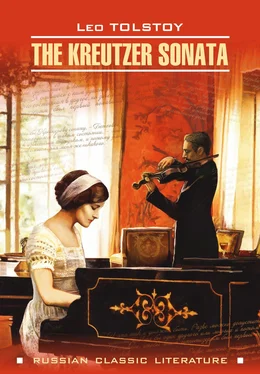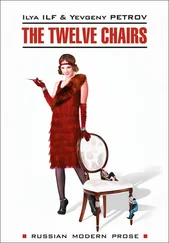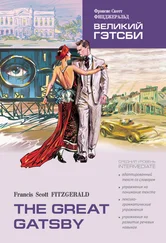“This fear, – the wife must fear her husband; that is what fear.”
“Oh, that, my little father [3] my little father – old Russian informal address
, that is ended.”
“No, madam, that cannot end. As she, Eve, the woman, was taken from man’s ribs, so she will remain unto the end of the world,” said the old man, shaking his head so triumphantly and so severely that the clerk, deciding that the victory was on his side, burst into a loud laugh.
“Yes, you men think so,” replied the lady, without surrendering, and turning toward us. “You have given yourself liberty. As for woman, you wish to keep her in the seraglio [4] seraglio – the part of a Muslim house or palace in which the wives and concubines are secluded; harem
. To you, everything is permissible. Is it not so?”
“Oh, man, – that’s another affair.”
“Then, according to you, to man everything is permissible?”
“No one gives him this permission; only, if the man behaves badly outside, the family is not increased thereby; but the woman, the wife, is a fragile vessel,” continued the merchant, severely.
His tone of authority evidently subjugated his hearers. Even the lady felt crushed, but she did not surrender.
“Yes, but you will admit, I think, that woman is a human being, and has feelings like her husband. What should she do if she does not love her husband?”
“If she does not love him!” repeated the old man, stormily, and knitting his brows; “why, she will be made to love him.”
This unexpected argument pleased the clerk, and he uttered a murmur of approbation.
“Oh, no, she will not be forced,” said the lady. “Where there is no love, one cannot be obliged to love in spite of herself.”
“And if the wife deceives her husband, what is to be done?” said the lawyer.
“That should not happen,” said the old man. “He must have his eyes about him.”
“And if it does happen, all the same? You will admit that it does happen?”
“It happens among the upper classes, not among us,” answered the old man. “And if any husband is found who is such a fool as not to rule his wife, he will not have robbed her. But no scandal, nevertheless. Love or not, but do not disturb the household. Every husband can govern his wife. He has the necessary power. It is only the imbecile who does not succeed in doing so.”
Everybody was silent. The clerk moved, advanced, and, not wishing to lag behind the others in the conversation, began with his eternal smile:
“Yes, in the house of our employer, a scandal has arisen, and it is very difficult to view the matter clearly. The wife loved to amuse herself, and began to go astray. He is a capable and serious man. First, it was with the book-keeper. The husband tried to bring her back to reason through kindness. She did not change her conduct. She plunged into all sorts of beastliness. She began to steal his money. He beat her, but she grew worse and worse. To an unbaptized, to a pagan, to a Jew (saving your permission), she went in succession for her caresses. What could the employer do? He has dropped her entirely, and now he lives as a bachelor. As for her, she is dragging in the depths.”
“He is an imbecile,” said the old man. “If from the first he had not allowed her to go in her own fashion, and had kept a firm hand upon her, she would be living honestly, no danger. Liberty must be taken away from the beginning. Do not trust yourself to your horse upon the highway. Do not trust yourself to your wife at home.”
At that moment the conductor passed, asking for the tickets for the next station. The old man gave up his.
“Yes, the feminine sex must be dominated in season, else all will perish.”
“And you yourselves, at Kounavino, did you not lead a gay life with the pretty girls?” asked the lawyer with a smile.
“Oh, that’s another matter,” said the merchant, severely. “Good-by,” he added, rising. He wrapped himself in his cloak, lifted his cap, and, taking his bag, left the car.
Scarcely had the old man gone when a general conversation began.
“There’s a little Old Testament father for you,” said the clerk.
“He is a Domostroy [5] The Domostroy – a matrimonial code of the days of Ivan the Terrible (1530–1584)
,” said the lady. “What savage ideas about a woman and marriage!”
“Yes, gentlemen,” said the lawyer, “we are still a long way from the European ideas upon marriage. First, the rights of woman, then free marriage, then divorce, as a question not yet solved.” …
“The main thing, and the thing which such people as he do not understand,” rejoined the lady, “is that only love consecrates marriage, and that the real marriage is that which is consecrated by love.”
The clerk listened and smiled, with the air of one accustomed to store in his memory all intelligent conversation that he hears, in order to make use of it afterwards.
“But what is this love that consecrates marriage?” said, suddenly, the voice of the nervous and taciturn gentleman, who, unnoticed by us, had approached.
He was standing with his hand on the seat, and evidently agitated. His face was red, a vein in his forehead was swollen, and the muscles of his cheeks quivered.
“What is this love that consecrates marriage?” he repeated.
“What love?” said the lady.
“The ordinary love of husband and wife.”
“And how, then, can ordinary love consecrate marriage?” continued the nervous gentleman, still excited, and with a displeased air. He seemed to wish to say something disagreeable to the lady. She felt it, and began to grow agitated.
“How? Why, very simply,” said she.
The nervous gentleman seized the word as it left her lips.
“No, not simply.”
“Madam says,” interceded the lawyer indicating his companion, “that marriage should be first the result of an attachment, of a love, if you will, and that, when love exists, and in that case only, marriage represents something sacred. But every marriage which is not based on a natural attachment, on love, has in it nothing that is morally obligatory. Is not that the idea that you intended to convey?” he asked the lady.
The lady, with a nod of her head, expressed her approval of this translation of her thoughts.
“Then …” resumed the lawyer, continuing his remarks.
But the nervous gentleman, evidently scarcely able to contain himself, without allowing the lawyer to finish, asked:
“Yes, sir. But what are we to understand by this love that alone consecrates marriage?”
“Everybody knows what love is,” said the lady.
“But I don’t know, and I should like to know how you define it.”
“How? It is very simple,” said the lady.
And she seemed thoughtful, and then said:
“Love … love … is a preference for one man or one woman to the exclusion of all others…”
“A preference for how long? … For a month, two days, or half an hour?” said the nervous gentleman, with special irritation.
“No, permit me, you evidently are not talking of the same thing.”
“Yes, I am talking absolutely of the same thing. Of the preference for one man or one woman to the exclusion of all others. But I ask: a preference for how long?”
“For how long? For a long time, for a life-time sometimes.”
“But that happens only in novels. In life, never. In life this preference for one to the exclusion of all others lasts in rare cases several years, oftener several months, or even weeks, days, hours …”
“Oh, sir. Oh, no, no, permit me,” said all three of us at the same time.
The clerk himself uttered a monosyllable of disapproval.
Читать дальше












